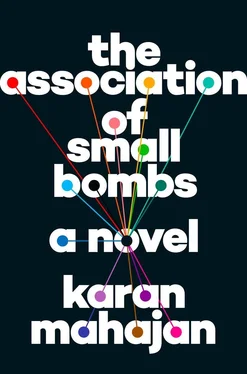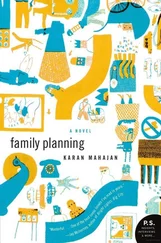After leading him to another alley, Ayub ushered Mansoor into a small room that looked like the waiting area of a homeopath. When they’d been driving over, Ayub had told him he was taking him to the office of a friend’s Islamic venture capitalist fund, which the friend allowed Ayub to use on weekends. “What does Islamic VC mean, exactly?” Mansoor had asked.
“It’s a normal venture fund,” Ayub said, “but you only invest in Sharia-approved companies. So, for example, if a company is involved in processing pork, you won’t invest in it.”
“What about a company that generates interest?”
“That too. You can only invest in Islamic banks.”
“It’s the way activists want the endowments of universities to be purified,” Mansoor said, vaguely remembering a discussion he’d had with his friend Alex.
The women were sitting on a Rexine bench in the decrepit VC office, pressed together. One was young and pretty and wore all black and kept her head covered; another had a nose ring, with little fountains of hair visible under her dupatta; the third was toothless, gross featured, henna haired. But Mansoor could not see them, not really. As they spoke, holding their own wrists, as if permanently taking their pulses, they were swallowed up by their stories. One woman told Mansoor how her husband had been pumped with petrol in the anus. Another said her son had been hung from the ceiling of a police station till he lost all feeling in his hands. “He can’t write anymore,” she sniffled. The last one narrated an even bleaker story. Her son, Malik, a student from Kathmandu, where he had also worked in his uncle’s carpet shop, had been shocked in the genitals and had had some of his tongue scraped off with a blunt knife. “They do it in such a way that you can still talk, but you sound like a stutterer,” she said, displacing the cruelty she’d experienced onto the imaginary stutterer, whom she mentioned with contempt.
The cascade of horrors, the way they were narrated, with fiery intention but also deadness in the eyes, the eyes having turned into shields that guarded the inside rather than bringing light from the outside, reminded Mansoor of how he himself talked about the blast. After a certain point the violence in your life acquires unreality through repetition. What could he really recall of the day of the bombing? The heat, flying swords of metal, pools of blood, deafness, a watery distance from everything. But really what he recalled was getting up and running way, the walk home.
At the end of each story, Mansoor nodded his head — that’s all.
After the meeting, Ayub asked, “What do you think?”
They were again in the alley, which was quiet now, evacuated of the schoolkids, broken only by the hiss of the illegal wires hanging overhead.
“It’s terrible,” Mansoor said.
Mansoor became active in the group, going over to the room in Defence Colony two or three times a week for meetings, telling his parents that the NGO worked for “communal harmony.”
His mother was happy that her son had found a source of distraction while he healed. His father, meanwhile, energized by Mansoor’s presence, took him around to look at houses. “It’s time to buy a new flat,” he told Mansoor. “We need a bigger place and anyway South Ex is so noisy and polluted now.” He had become fixated on this project, even though most of the flats they saw were out of their price range or in colonies like Neeti Bagh where the sellers would never deal with Muslims.
Mansoor was in pain still but felt oddly content. He was healing and would return to the U.S. for his spring semester, which began in January. It was November now.
Peace For All had serious intentions but was also a friendly group. The twenty-odd members knew each other well and were jokey and friendly and relaxed before and after meetings. There was Shahid, a tall man with enormous hands, plastered balding hair, and a goofy grin with gapped teeth, a second-year mass com student from Jamia. Jacob, the only Christian in the group, thin and nervous and colored with pimples, studied chemistry at St. Stephen’s. Zeenat was working toward a diploma in computers from NIIT. Tariq had graduated from a forest management institute in Maharashtra but obviously hated forests — you could see it in the way he cursed whenever a mosquito buzzed near him. They were seekers. They had witnessed what Narendra Modi, the chief minister of Gujarat, had done in his state in March, how he and his administration had stood by, in localities like Naroda Patiya, Meghaninagar, and Bapunagar, as violent Hindu mobs, armed with swords, petrol bombs, tridents, and water pistols to spray fuel, had set upon Muslims, burning them alive, tearing infants from mothers and fetuses from wombs, raping women, killing a thousand. And they had realized that the Indian government wouldn’t protect them, that in fact it had an incentive to demonize and exterminate them. The members of Peace For All were not radicals. They were eminently reasonable people, students engrossed in careers, people who wanted to be Indians but had discovered themselves instead to be Muslims and had started to embrace their identities. In their alienation, their desire to be included in the mainstream, Mansoor recognized himself.
“Do you think they’ll let Muslims get away with that?” Zeenat might say, for example, when someone suggested a nonviolent protest.
“The police are the most corrupt. Just yesterday they stopped me and wanted to know where I was driving to at night.”
“Your idea of doing communal harmony workshops is very idealistic, but we need something more extreme to awaken people.”
Everyone had a story of being personally pegged for a Muslim too.
“Why do they always tell us to go back to Pakistan? You’re a Hindu — go to Nepal! And why shouldn’t I go to Malaysia?”
“The worst is when they say ‘Oh, you don’t look Muslim!’”
“I was once at my friend Akhil’s house and I made the mistake of touching his father’s Ramayan. That man, a baldie, started shouting, ‘You’ve soiled it! Dharmbhrasht kar diya!’ He made poor Akhil pour Ganga water on it from a Bisleri to purify it.”
Mansoor sat cross-legged, bringing his bare feet together anxiously with his hands, pressing his soles together.
The voice of reason, of knowledge, during these raucous meetings was Ayub. Ayub was twenty-seven and from Azamgarh, but seemed older; it was as if he had digested recent history and sociology and philosophy, and could draw links between subjects without being the least bit pedantic. With his quick-fire noun-laden sentences, he made knowledge attractive . “The Brotherhood in Egypt is primarily a social organization. It only became politicized when they were persecuted, when their leaders were locked up in jail. I don’t think Qutb was a great thinker as others do, but why martyr him?” People nodded their heads dreamily, not knowing much about Egypt or Qutb. But Ayub’s style was inclusive, and Mansoor felt he could understand the problems of Muslims elsewhere too.
Then one Friday morning, after a meeting, as they all got up to leave, Ayub asked Mansoor, “Are you coming to the mosque with us?”
“I don’t have my car here,” Mansoor said.
“No problem, yaar, I can take you.”
Mansoor had been hesitant to get involved with the religious aspects of the group; it wasn’t that he disliked religion but that he felt it was outside his purview. When he heard the members talk about the rulings of the ulema, or what al-Tabari had written about the fitnah, or the corruption of the Uthman, he instinctively zoned out, the way he did when his mother was overcome with piety two or three times a year, increasing the rakat in her prayers and promising a sadqa for the poor to express thanks to God for Mansoor’s continued health.
Читать дальше












